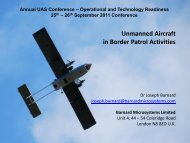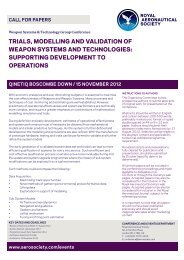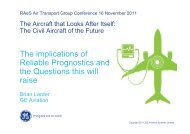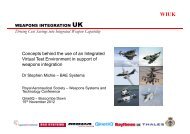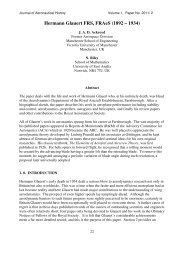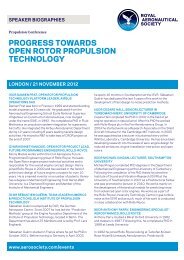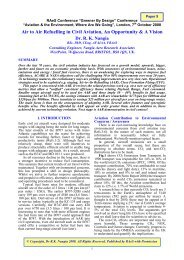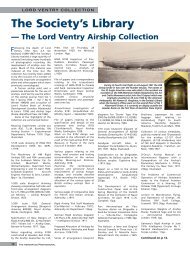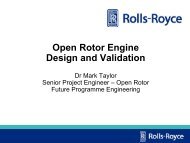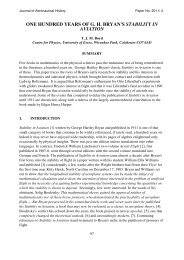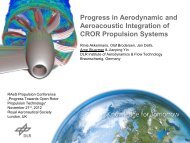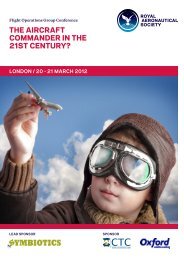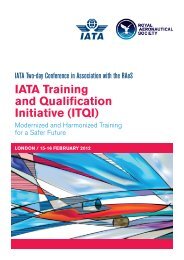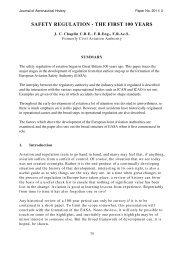DTS Paper.qxp - Royal Aeronautical Society
DTS Paper.qxp - Royal Aeronautical Society
DTS Paper.qxp - Royal Aeronautical Society
Create successful ePaper yourself
Turn your PDF publications into a flip-book with our unique Google optimized e-Paper software.
Aerospace and the UK<br />
Defence Industry and<br />
Technology Strategy<br />
EXECUTIVE SUMMARY<br />
A Specialist <strong>Paper</strong> prepared by<br />
Prof Keith Hayward, FRAeS †<br />
Head of Research at the <strong>Royal</strong> <strong>Aeronautical</strong> <strong>Society</strong><br />
In publishing its Defence Technology Strategy, the UK Ministry of Defence has now completed the first stage of its ‘roadmap’ for the<br />
future of the UK defence industrial base and its main technological concerns. The MoD framework provides a set of guiding principles<br />
and an indication of priorities for both the MoD and industry. As such, they have been welcomed by industry as a means of guiding<br />
its investment with a higher degree of confidence than hitherto and enabling companies to play their full part in meeting MoD<br />
requirements over the next decade.<br />
This Discussion <strong>Paper</strong> examines the implications for the UK aerospace sector of the MoD’s strategy. It outlines the main features of the<br />
two key MoD documents 1 but its main focus is on the implications of the Defence Technology Strategy on the aerospace sector. These<br />
will be profound: the MoD is unlikely to invest in conventional aircraft platform technology beyond the Typhoon and F-35. There will<br />
be investment in mission systems and complex weapons technology acquisition as well as in systems integration. Materials technology<br />
is also seen as a key cross-cutting investment. Research will also be focused on improving through life support and maintenance. The<br />
strategy confirms the movement towards unmanned systems and networks.<br />
Industry will be expected increasingly to support its own applied research in part shaped by reference to the MoD’s now published<br />
guidelines. However, there are unresolved issues relating to the long-term stability of the MoD plan and UK companies may continue<br />
to find greater opportunities offshore with the risk of increased dependence on particularly the US market with its restrictions on<br />
technology transfer.<br />
The <strong>DTS</strong> poses a major challenge to the conventional view of an aerospace professional. Working on defence projects will remain a<br />
stimulating and rewarding intellectual career — indeed, the more so given the complexity of some of the high level systems envisaged<br />
for the future. The demand will be for flexible, adaptable professionals, perhaps with a wider range of educational experience than<br />
the traditional aerospace engineer. However, maintaining the human base of the UK defence industry will not come cheap to maintain<br />
real capability, but it should be an essential element in a long-term strategy<br />
While the MoD’s view of the future is based on a solid diagnosis of the trends and developments in the defence industrial sector, the<br />
prescription offered in terms of technology investment is more geared to the MoD’s needs and concerns. While this may be<br />
understandable, there is a risk overall of some diversion between the MoD’s requirements and those of UK-based industry.<br />
While the <strong>Royal</strong> <strong>Aeronautical</strong> <strong>Society</strong> is not directly involved in the evolution of UK defence industrial and technological policy, it does<br />
have a role in monitoring events on behalf of its members, contributing to the debate on policy and, through its specialist committees,<br />
helping to shape views about emerging technologies.<br />
1 Ministry of Defence, Defence Industrial Strategy, December 2005 and<br />
Ministry of Defence, Defence Technology Strategy, October 2006.<br />
† Prof Hayward is Head of Research at the <strong>Royal</strong> <strong>Aeronautical</strong> <strong>Society</strong>. He is the author of several books and articles<br />
on defence and aerospace and has been a consultant to public and private agencies in the UK, US and Europe.<br />
FEBRUARY 2007 3



